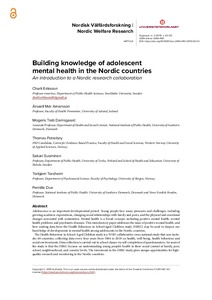Building knowledge of adolescent mental health in the Nordic countries
Eriksson Charli; Arnarsson Arsaell Mar; Damsgaard Mogens Trab; Potrebny Thomas; Suominen Sakari K; Torsheim; T; Due; P
https://urn.fi/URN:NBN:fi-fe2021042611989
Tiivistelmä
Adolescence is an important developmental period. Young people face many pressures and challenges, including growing academic expectations, changing social relationships with family and peers, and the physical and emotional changes associated with maturation. Mental health is a broad concept, including positive mental health, mental health problems and psychiatric diseases. This introductory paper addresses the issue of positive mental health, and how existing data from the Health Behaviour in School-aged Children study (HBSC) may be used to deepen our knowledge of developments in mental health among adolescents in the Nordic countries.
The Health Behaviour in School-Aged Children study is a WHO collaborative cross-national study that now includes 48 countries, collecting data every four years from 1984 to 2018 on health, well-being, health behaviour and social environments. Data collection is carried out in school classes via self-completion of questionnaires. An asset of the study is that the HBSC focuses on understanding young people’s health in their social context at family, peer, school, neighbourhood, and country levels. The investment in the HBSC study gives unique opportunities for high-quality research and monitoring in the Nordic countries.
The on-going Nordic research collaboration on positive mental health among adolescents uses the HBSC study as the research infrastructure for analysing trends as well as collecting new data on positive mental health. This special issue reports on trends when positive perspectives have been guiding the analysis of available data. The present research explores the potential of Nordic collaboration and comparative studies of school-aged children in the Nordic countries.
Kokoelmat
- Rinnakkaistallenteet [29335]
